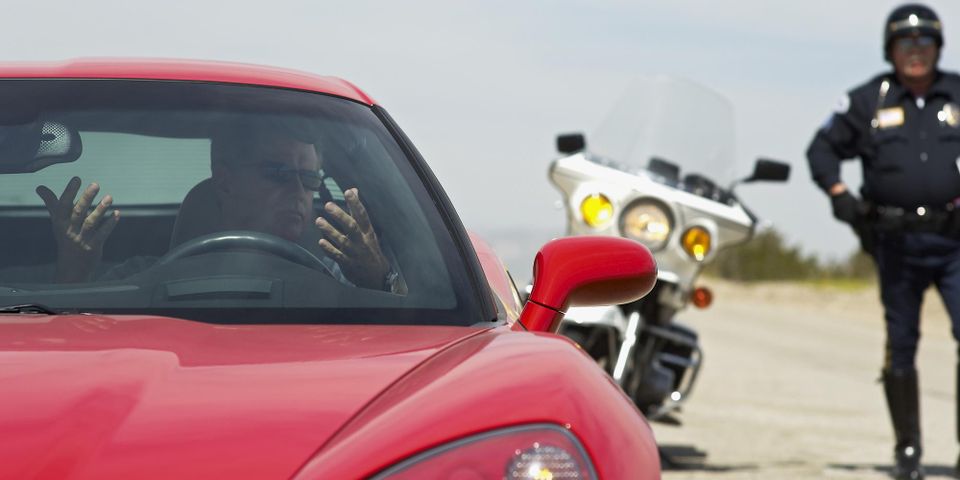
The actions you make at a traffic stop can carry weight in the court proceedings that could follow. If you are pulled over, remain calm and consider the points below to navigate anything from a potential traffic ticket to more severe circumstances.
What You Can Do When You’re Pulled Over by the Police
1. Pull Over to a Safe Place
When the officer turns on their lights, they will want you to pull over to the right side of the road relatively quickly. Try to find a well-lit area at night for both you and the officer’s safety with the traffic stop. If necessary, turn on your emergency flashers and drive slower than usual to let the officer know that you’ve seen him and are trying to pull over safely.
2. Stay in the Car
When you pull over, unless the officer says otherwise, you should stay in your car. Any attempt at getting out can come off as aggression to the cop. If it’s nighttime, turn on your interior lights for the officer, and have the window rolled down by the time they approach your vehicle.
While this may feel strange obliging to the officer, keep in mind that this is an unpredictable situation for them as well, as they could get hit while walking up to your vehicle or encounter an altercation with the driver they’ve pulled over.
3. Wait for the Officer to Ask for Documents
To eliminate the possibility of a threat, a strong course of action is to roll down the window and keep your hands on the steering wheel until the driver asks for your license and registration. When grabbing these materials, try to do so slowly and deliberately. If your wallet is behind you in a bag, verbally let the officer know before reaching for it. Have your registration and proof of insurance readily available, so you don’t have to rummage through your glove compartment.
Finally, if you have a gun in your car with a concealed carry permit, some states require you to inform the officer that it exists. Doing so lets them know you mean no harm, and on the off-chance that they see your gun, the situation has less potential to escalate.
4. Be Polite
 One commonly assumes that an officer has already decided to give you a traffic ticket before they even walk up to your car. With that in mind, they’ve probably already decided to give you a warning before walking up as well, and that opinion can only go south with a poor attitude.
One commonly assumes that an officer has already decided to give you a traffic ticket before they even walk up to your car. With that in mind, they’ve probably already decided to give you a warning before walking up as well, and that opinion can only go south with a poor attitude.
A traffic ticket is a frustrating scenario, but even if you plan to contest the charge, try to keep your answers brief and remain courteous to the officer. The traffic stop is not the time to argue; that time will come on your scheduled date in traffic court.
5. Consent or Deny a Search When Asked
You have the Fourth Amendment right in the United States to deny an officer consent to search your home, vehicle, or other personal property without probable cause. During a traffic stop, if an officer doesn’t have this probable cause but wants to conduct a search anyways, they will ask you casually to look inside your car. In response to this request, if you don’t want to consent even if you have nothing to hide, you have the right to firmly state, “I do not consent to a search, officer.”
If the officer continues to search your car anyways, this phrase will have the best shot at defending your Fourth Amendment rights in court even if the officer finds something in that search without consent. A court can use a solid, undeniable rejection to hold an officer liable for violating your Fourth Amendment rights, but sometimes varying from that phrasing above, like, “I’d rather you didn’t search my car,” or even, “I don’t think so,” isn’t enough to sway them.
If an officer asks you to exit your vehicle, however, you must oblige based on legal precedence. Only do so if asked—otherwise, remain in the car—but remain polite and follow the officer’s instructions.
6. Sign the Citation
If the officer does ultimately write a traffic ticket, they’ll ask you to sign it. Signing this document does not admit guilt, it simply recognizes that you’re aware that you’ve received it and that you will either pay the fine or show up to court on the listed date. In most states, this signature replaces a cash bond and saves you a trip to the nearest jail or judge for the booking process, fingerprints and all.
If you have a concern about a traffic ticket you recently received, a lawyer can advise you on options to avoid points on your license and increased insurance rates. The attorneys at David S. Washington, Jr. in Hamilton, OH, have more than 22 years of experience in criminal defense law to guide your case towards the best outcome—whether it’s a simple speeding ticket or a DUI case. To schedule an initial consultation with their expert team, call (513) 751-1400 or visit their website for more information about their legal services.
About the Business
Have a question? Ask the experts!
Send your question

